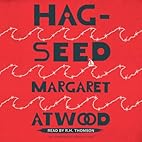Bailey Prize Longlist
The Hogarth Series is a set of modern books commissioned to be written based on Shakespeare plays.
- The Gap of Time by Jeannette Winterson (The Winter's Tale)
- Shylock is My Name by Howard Jacobson (The Merchant of Venice)
- Vinegar Girl by Anne Tyler (The Taming of the Shrew)
- Hag-Seed by Margaret Atwood (The Tempest)
- New Boy by Tracy Chevalier (Othello)
I feel like I always forget how good of a writer that Atwood is. She writes very accessible prose, with lots of dialogue which sometimes surprises me because she gets so many literary awards. Literary award winners can be too intellectual for me at times, but her books, while deep, are readable.
I'm not up on many Shakespeare plays, but reading them as retellings is kinda cool. I knew nothing about The Tempest before this book and I'm sure I missed many, many references. Hag-Seed (one of the Shakespearean insults from the play) tells the story of a man seeking revenge for being fired as a director of a local acting company. Felix (Prospero) bides his time, and eventually becomes a literacy teacher at a prison, putting on Shakespeare plays with the inmates. He enacts his revenge (weakest part of the book - it seemed a petty grievance at best) some twelve years later (best served cold?) during the production of The Tempest, the play he was fired over. His daughter Miranda who died at age two continues to hang around him, which added to the weirdness. I kept thinking Felix was not too stable overall, especially when he explained to his 'daughter' that cars are flying machines of the future.
The prisoners were entertaining as they plan their version of the play. (As a teacher, the way the students buy into the play ideas was, shall I say, idealistic? But it was entertaining) Raps, after-the-play predictions of their characters, and their swearing with only Shakespearean insults were well-done. I think this would make a good TV movie, with the elements of farce and action in the big climax of the play at the prison.
At the end of the book, the play The Tempest was explained so the reader could see the parallels. There was a lot of information given out there and I re-listened to this several times, trying to make the connections. Atwood did a good job making the parallels, and having the plot hinge on a production of The Tempest was pretty good.
A note on the narrator - R. H. Thompson does a fabulous job! I am a fan of his and getting to listen to him read for 8 hours was a bonus. I remember him from Road to Avonlea, and Glory Enough for All, the story of Banting and Best, Canadian doctors who discovered insulin. Great Canadian actor!








